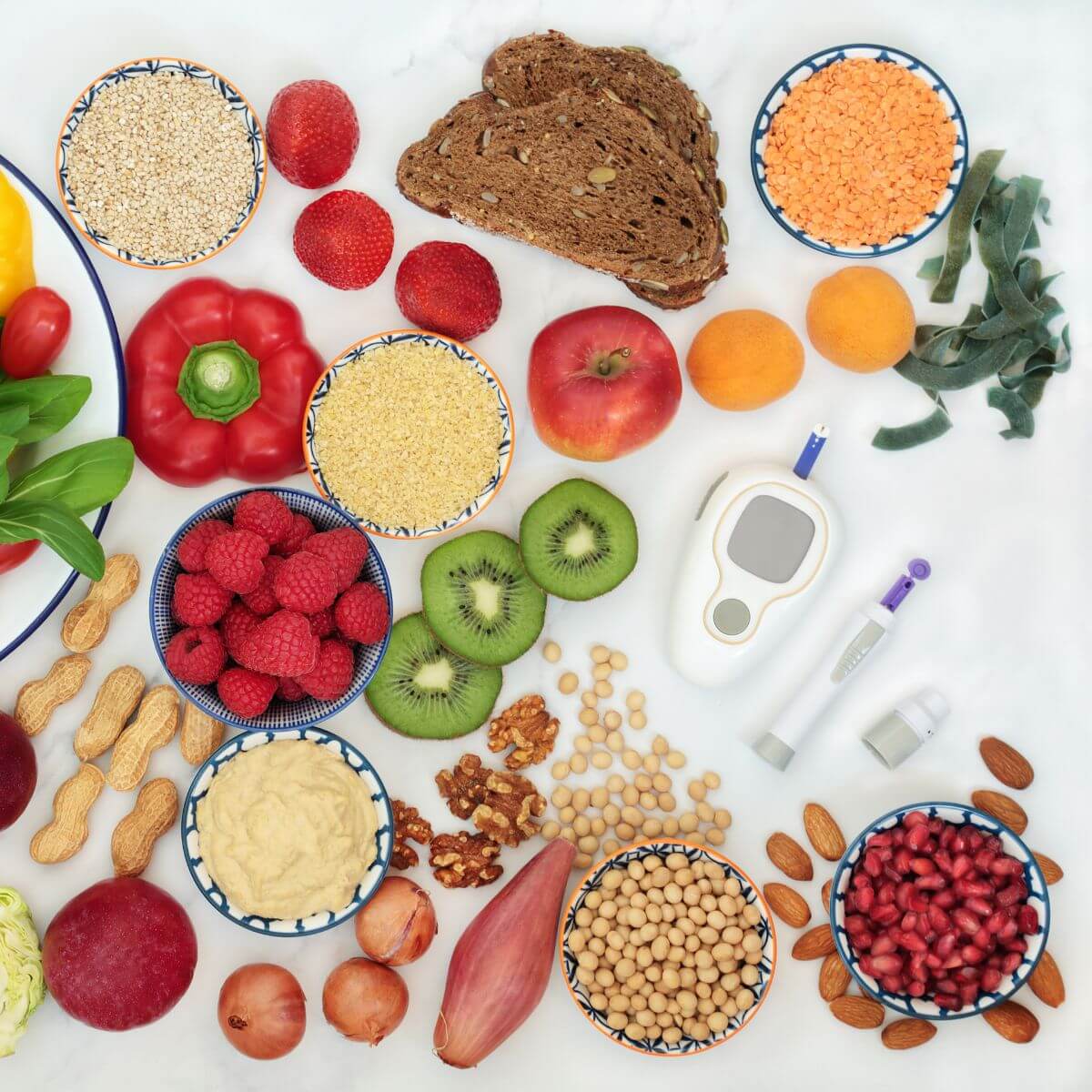In the realm of health and well-being, the gut microbiome has emerged as a crucial player when it comes to metabolism. So, in this article, we’ll dive deeper into the importance of gut health for metabolic wellness, exploring why it matters, how the metabolic gut health connection works for our metabolism, and the specific strains of bacteria in our microbiome are involved.

Why Does Gut Health Matter for Metabolism?
This intricate ecosystem of trillions of microorganisms residing in our digestive tract isn’t just responsible for digestion, it also holds the key to metabolic health.
Gut Bacteria And Inflammation: What Role Does Diet Play?
Gut bacteria and inflammation are intricately linked, and diet plays a crucial role in modulating this relationship.
The human gastrointestinal tract is inhabited by a diverse community of microorganisms, collectively referred to as the gut microbiota.
These microorganisms include:
- Bacteria
- Viruses
- Fungi
- And archaea.
The composition and balance of this microbiota are influenced by various factors, with diet being a primary determinant!
👍 Different dietary components can selectively promote the growth of specific types of gut bacteria.
For instance, a diet rich in fiber and plant-based foods supports the proliferation of beneficial bacteria, such as Bifidobacterium and Lactobacillus.
👎 On the other hand, a diet high in sugar, saturated fats, and processed foods can encourage the growth of less desirable bacteria, including certain proinflammatory strains.
The gut mucosa acts as a barrier that separates the gut lumen, where the microbiota resides, from the bloodstream.
Disruption of this barrier, often referred to as “leaky gut,” can occur due to various factors, including inflammation.
Inflammation in the gut can weaken the tight junctions between intestinal cells, allowing the passage of bacteria and their byproducts into the bloodstream.
When this inflammation becomes chronic, it can lead to systemic inflammation, which is associated with a wide range of health conditions, including:
- Inflammatory bowel diseases
- Metabolic syndrome
- And autoimmune diseases.
On the flip side, a healthy diet can induce positive changes in the gut microbiota and influence the production of metabolites, including short-chain fatty acids (SCFAs) like butyrate, acetate, and propionate.
SCFAs have anti-inflammatory properties and help maintain the integrity of the gut barrier.
It’s clear that diet plays a significant role in shaping the composition of the gut microbiota, which in turn influences gut barrier function and inflammation. 🔥
NUTRIENT ABSORPTION
In the world of metabolism, efficient nutrient absorption is paramount. The gut microbiome plays a vital role in this process.
A healthy gut microbiome ensures that the nutrients we consume, including carbohydrates, proteins, and fats, are efficiently broken down and absorbed through metabolism.
This efficient absorption is not only essential for overall health but also directly influences metabolic processes.
INFLAMMATION CONTROL
Chronic inflammation is a known driver of metabolic disorders like insulin resistance and type 2 diabetes.
An imbalanced gut microbiome can contribute to chronic inflammation, making it a key player in the link between gut health and metabolism.
So, a balanced microbiota helps control inflammation, which is essential for maintaining metabolic health.
HORMONE REGULATION
Gut bacteria found in our microbiome aren’t just busy digesting food, they’re also involved in regulating hormones that significantly influence metabolism.
Two key hormones, insulin and ghrelin, have a direct impact on metabolic processes.
Dysbiosis, or microbial imbalance, can disrupt the regulation of these hormones, leading to metabolic disturbances.
SHORT-CHAIN FATTY ACIDS (SCFAs)
Short-chain fatty acids (SCFAs) are metabolic superheroes produced by beneficial gut bacteria through the fermentation of dietary fiber.
SCFAs, including acetate, propionate, and butyrate, have garnered attention for their role in metabolic health.
They contribute to improved insulin sensitivity and glucose metabolism, both of which are fundamental components of metabolic wellness.
How Does Gut Health and Microbiome Impact Metabolism?
GUT-BRAIN AXIS
The gut-brain axis is a complex bidirectional communication system that links the gut and the brain. It plays a pivotal role in regulating appetite, food choices, and energy balance.
A healthy gut microbiome helps maintain this crucial communication, supporting weight regulation and metabolic wellness.
When the gut-brain axis is disrupted due to dysbiosis, it can lead to cravings for unhealthy foods and disturbances in metabolic processes.
BILE ACID METABOLISM
Bile acids are essential for the digestion and absorption of fats. Gut bacteria in our microbiome influence bile acid metabolism, making them pivotal players in lipid digestion and absorption.
An imbalance in gut bacteria can lead to disruptions in lipid metabolism, affecting both weight and overall metabolic health.
GUT PERMEABILITY
Dysbiosis can increase gut permeability, a condition commonly referred to as “leaky gut.”
When the intestinal lining becomes more permeable than it should be, it allows harmful substances to enter the bloodstream.
This triggers an immune response and inflammation, which can contribute to insulin resistance and metabolic disorders. The gut lining’s integrity is vital for metabolic wellness.
ENERGY HARVESTING
Some gut bacteria have a unique talent. They can extract additional calories from food through fermentation. While this may seem advantageous, it can disrupt energy balance.
For example, when the gut microbiome ferments complex carbohydrates and fibers resistant to digestion, it generates extra calories in the form of SCFAs.
These extra calories can influence overall energy balance and metabolism over time.
Specific Strains of Bacteria Involved
BIFIDOBACTERIUM
Bifidobacterium, a well-known probiotic strain, has been associated with improved insulin sensitivity and reduced inflammation.
It also plays a crucial role in fermenting dietary fiber, producing SCFAs that support metabolic health.
AKKERMANSIA MUCINIPHILA
Akkermansia muciniphila is gaining recognition for its potential in enhancing gut barrier function. This bacterium also helps maintain the integrity of the gut lining, reducing gut permeability.
By doing so, it contributes to better metabolic health, a diverse microbiome, and reduced inflammation.
FAECALIBACTERIUM PRAUSNITZII
Faecalibacterium prausnitzii is a prominent butyrate-producing bacterium.
Butyrate is a SCFA linked to improved glucose metabolism and insulin sensitivity, also making this bacterium a valuable player in metabolic wellness.
LACTOBACILLUS
Certain strains of Lactobacillus have shown promise in regulating blood sugar levels and improving insulin sensitivity.
So, these probiotics can positively impact metabolic health.
ROSEBURIA
Roseburia, like Faecalibacterium prausnitzii, is another important butyrate producer.
It has demonstrated its role in enhancing glucose metabolism and supporting overall metabolic health.
Practical Steps to Support Gut-Driven Metabolic Wellness
Understanding the profound influence and connection the gut microbiome has on metabolic health and wellness, here are some practical steps to nurture a healthy gut and support metabolic health.

1. FIBER-RICH DIET
Consuming a diet rich in fiber from fruits, vegetables, whole grains, and legumes provides nourishment for beneficial gut bacteria.
Fiber also promotes a diverse microbiome, supports regular bowel movements, and enhances feelings of fullness—crucial for metabolic health and wellness.
2. PROBIOTICS AND PREBIOTICS
Incorporate probiotic-rich foods like yogurt, kefir, kimchi, and sauerkraut into your diet to introduce beneficial bacteria.
Additionally, include prebiotic fiber sources such as garlic, onions, asparagus, and bananas.
Prebiotics also provide the necessary nutrients for the growth of these beneficial microbes.
3. BALANCED NUTRITION
Maintain a balanced intake of macronutrients—carbohydrates, proteins, and fats.
This balanced nutrition also supports metabolic processes and ensures that your body receives the essential building blocks it needs to function optimally.
4. MINIMIZE PROCESSED FOODS
Limit processed and sugary foods that can disrupt gut balance and promote inflammation.
These dietary choices can have detrimental effects on both the gut microbiome and metabolic health.
5. REGULAR PHYSICAL ACTIVITY
Engage in regular exercise to boost metabolic health, enhance insulin sensitivity, and aid in weight management.
In addition, exercise supports the body in efficiently using energy and maintaining a healthy weight.
6. STRESS MANAGEMENT
Chronic stress can negatively affect gut health and metabolism.
Practice stress-reduction techniques like meditation, yoga, deep breathing exercises, or spending time in nature to promote a healthier gut-brain connection.
7. QUALITY SLEEP
Prioritize getting 7-9 hours of quality sleep each night. Inadequate sleep can also disrupt metabolic processes, affecting appetite hormones, insulin sensitivity, and weight regulation.
8. PERSONALIZED APPROACH
Consider personalized dietary and lifestyle strategies tailored to your unique gut microbiome composition.
Emerging research suggests that personalized approaches may yield the most significant benefits for metabolic health.
Advances in microbiome testing can also provide valuable insights into which dietary and lifestyle modifications may be most effective for you.
Learn more about how I support the gut through my programs.

CONCLUSION
The profound connection between gut health and metabolic wellness cannot be overstated.
Understanding the intricate interplay between our metabolic health and the gut connection is important when it comes to staying healthy.
The gut microbiota and metabolic processes empowers individuals to take proactive steps toward lasting metabolic wellness.
So, by nurturing a balanced gut microbiome through mindful dietary, health, and lifestyle choices, individuals can optimize their metabolic well-being, reduce the risk of metabolic disorders, and embark on a journey toward a healthier, more vibrant life.
Recognizing the integral connection between gut health, our microbiome, and metabolism is the first step in achieving lasting metabolic wellness.
Were you aware of the role diet plays when it comes to inflammation in the gut? Let’s discuss this in the comments below.
REFERENCES
- Fan, Y., Pedersen, O. Gut microbiota in human metabolic health and disease. Nat Rev Microbiol 19, 55–71 (2021). https://doi.org/10.1038/s41579-020-0433-9. https://doi.org/10.1038/s41579-020-0433-9
- Kim, G., Yoon, Y., Park, J.H. et al. Bifidobacterial carbohydrate/nucleoside metabolism enhances oxidative phosphorylation in white adipose tissue to protect against diet-induced obesity. Microbiome 10, 188 (2022). https://doi.org/10.1186/s40168-022-01374-0. https://doi.org/10.1186/s40168-022-01374-0
- Juan Yan, Lili Sheng & Houkai Li (2021) Akkermansia muciniphila: is it the Holy Grail for ameliorating metabolic diseases?, Gut Microbes, 13:1, DOI: 10.1080/19490976.2021.1984104
- Lebas M, Garault P, Carrillo D, Codoñer FM, Derrien M. Metabolic Response of Faecalibacterium prausnitzii to Cell-Free Supernatants from Lactic Acid Bacteria. Microorganisms. 2020; 8(10):1528. https://doi.org/10.3390/microorganisms8101528. 10.3390/microorganisms8101528
- Aggarwal J, Swami G, Kumar M. Probiotics and their Effects on Metabolic Diseases: An Update. J Clin Diagn Res. 2013 Jan;7(1):173-7. doi: 10.7860/JCDR/2012/5004.2701. Epub 2013 Jan 1. PMID: 23449881; PMCID: PMC3576782. 10.7860/JCDR/2012/5004.2701
- Nie K, Ma K, Luo W, Shen Z, Yang Z, Xiao M, Tong T, Yang Y, Wang X. Roseburia intestinalis: A Beneficial Gut Organism From the Discoveries in Genus and Species. Front Cell Infect Microbiol. 2021 Nov 22;11:757718. doi: 10.3389/fcimb.2021.757718. PMID: 34881193; PMCID: PMC8647967. 10.3389/fcimb.2021.757718






